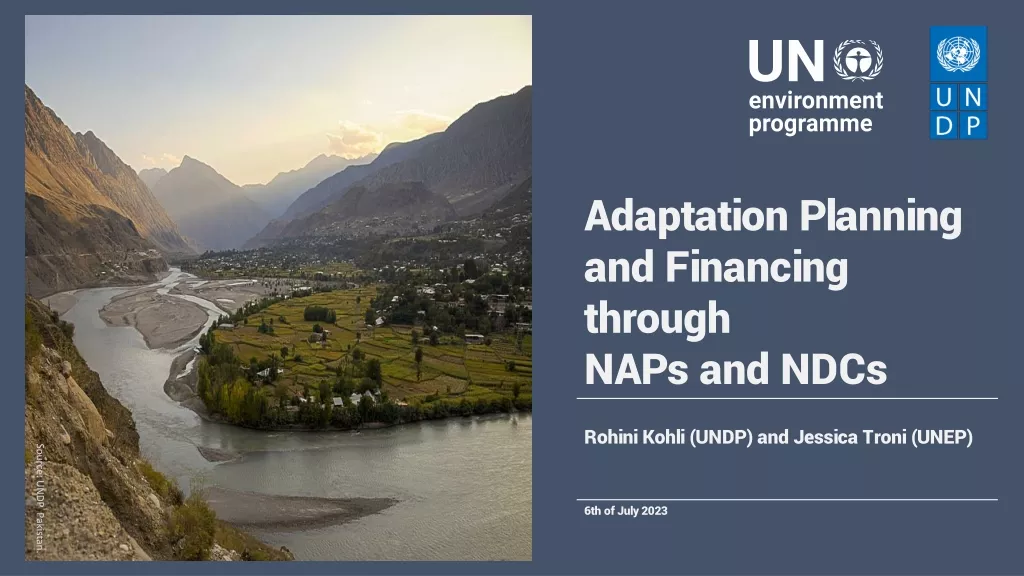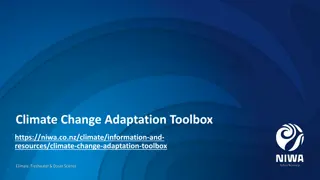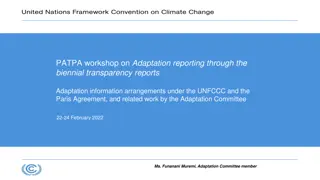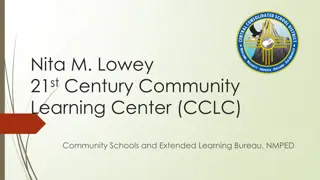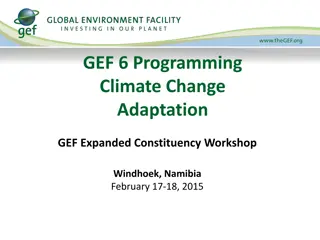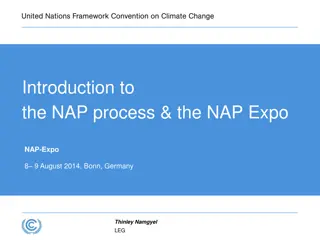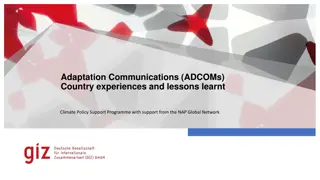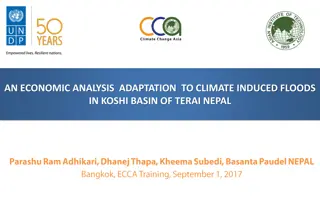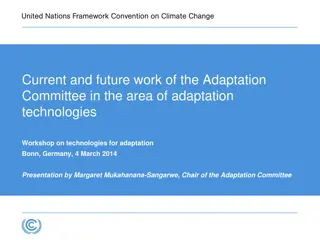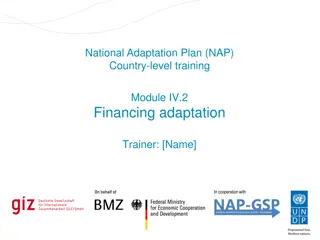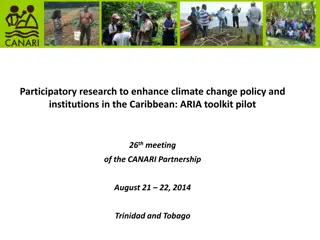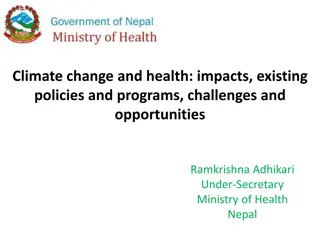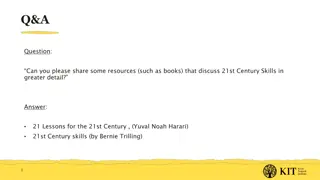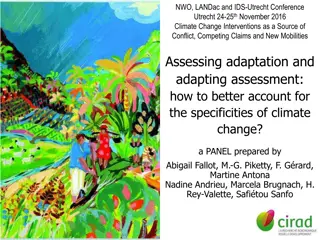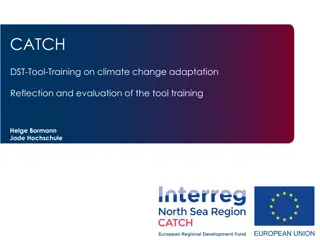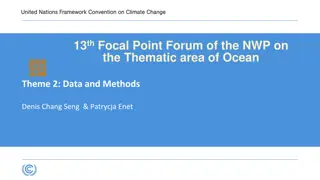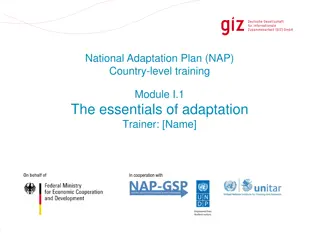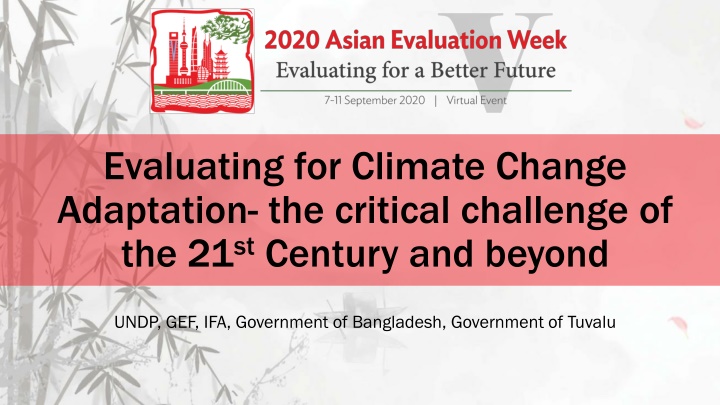
Evaluating Climate Change Adaptation in the 21st Century and Beyond
The critical challenge of climate change adaptation is explored through programs by UNDP, GEF, IFA, and governments of Bangladesh and Tuvalu. Nature-based solutions, key adaptation gaps, and cross-jurisdictional dependencies are discussed. Transformational change criteria and scaling up benefits globally are highlighted.
Download Presentation

Please find below an Image/Link to download the presentation.
The content on the website is provided AS IS for your information and personal use only. It may not be sold, licensed, or shared on other websites without obtaining consent from the author. If you encounter any issues during the download, it is possible that the publisher has removed the file from their server.
You are allowed to download the files provided on this website for personal or commercial use, subject to the condition that they are used lawfully. All files are the property of their respective owners.
The content on the website is provided AS IS for your information and personal use only. It may not be sold, licensed, or shared on other websites without obtaining consent from the author.
E N D
Presentation Transcript
Evaluating for Climate Change Adaptation- the critical challenge of the 21stCentury and beyond UNDP, GEF, IFA, Government of Bangladesh, Government of Tuvalu
Global context Oscar Garcia, Director, UNDP Independent Evaluation Office
Presentation structure Identifying and assessing programmes in light of key adaptation gaps (IFAD) Addressing the role of nature-based solutions (GEF) Capturing cross-jurisdictional dependencies (UNDP) Perspectives from Bangladesh and Tuvalu 3 7-11 September 2020 | VIRTUAL EVENT 2020 Asian Evaluation Week
Nature-based solutions (after Global Commission on Adaptation 2019; GEF STAP 2020) Work well at broad scale (watershed, coastal zone) Can be more cost-effective than engineered approaches (or can be applied in tandem with engineering works) Multiple benefits: mitigation and adaptation, heat, productive natural resources, water quality, improved health, job creation, biodiversity conservation Based on local knowledge and cultural values More lasting and sustainable solutions Synergies for people and nature! 5 7-11 September 2020 | VIRTUAL EVENT 2020 Asian Evaluation Week
Aim for Transformational Change Transformational Change 4 criteria 4 criteria RELEVANCE RELEVANCE DEPTH OF CHANGE DEPTH OF CHANGE SCALE OF CHANGE SCALE OF CHANGE SUSTAINABILITY SUSTAINABILITY Deep, systemic, sustainable change with large-scale impact in an area of global (environmental) concern Adopted from IEG. 2016. Supporting Transformational Change for Poverty Reduction and Shared Prosperity. 7-11 September 2020 | VIRTUAL EVENT 2020 Asian Evaluation Week
Scaling up It s a process: It s a process: Increasing magnitude of benefits Increasing magnitude of benefits + + Expanding geographical or sectoral areas Expanding geographical or sectoral areas of (global environmental) benefits to cover a defined ecological, economic, or governance unit 7 7-11 September 2020 | VIRTUAL EVENT 2020 Asian Evaluation Week
Evaluation beyond individual interventions Evaluations must be scoped to encompass a systems perspective: Open theory of change What is known in advance through science, literature, other evaluations Define system boundaries systems perspective (place evaluand in broader landscape) Look for unintended consequences (positive and negative) Different stakeholders have different priorities and perspectives Understand synergies and tradeoffs Use mixed methods: quantitative and qualitative 8 7-11 September 2020 | VIRTUAL EVENT 2020 Asian Evaluation Week
Challenges to Adapting to Climate Change Evaluations in Rural Agricultural Sector Full awareness of the urgency and gravity of the climate context at the national, subnational and local levels; government as well as smallholder farmers Changing mind sets - shifting from traditional practices to new practices to address escalating risks; Limited technical know-how to fully understand the human-eco system interaction Cost of switching to more climate adaptive technology and practices Weak rural financial architecture supporting climate adaptation 10 7-11 September 2020 | VIRTUAL EVENT 2020 Asian Evaluation Week
Best Responses to Challenges Evaluations What works and Why, Can we do better? Best ways to raise awareness of climate threats and advocating for measures to strengthen climate resilience stakeholders and beneficiaries EXTENSION SERVICES Best Solutions - Providing the necessary evidence-base, technical support and capacity development services to enhance climate resilience (e;g; Conservation Agriculture) Key platforms for facilitating learning platforms for peer-to-peer learning. South-South Exchanges Farmer Field Schools Strengthened extension services - Improve rural financial architecture to provide financing needed to invest in climate solutions Strengthen climate resilient value chains 11 7-11 September 2020 | VIRTUAL EVENT 2020 Asian Evaluation Week
Strengthening Climate Resilience An Evaluation Case Study in Eastern Europe Climate threats Climate threats: Increasing temperature, decreasing precipitation, increasing frequency of droughts, floods, and hailstorms Agricultural Systems Agricultural Systems Field crops (wheat, maize, etc.); Viticulture; Orchards National Response National Response: Prioritize Conservation Agriculture (national agricultural policy) Challenges to Adopting Challenges to Adopting- - smallholders and poor farmers. smallholders and poor farmers.- - IFAD Assessment: Buying into the new technology, particularly small holder farmers Transition costs and economies of scale for small holders Technical know-how: Services by Extension services, farmer field school demonstrations mostly targeting medium and large holders. Learning from other countries Bangladesh, Zambia, Zimbabwe, etc Availability of incentives & adequacy of rural financial architecture Restoring eco-systems Vs lowering harm done to eco-systems IFAD Assessment: 12 7-11 September 2020 | VIRTUAL EVENT 2020 Asian Evaluation Week
UNDP David Slattery, Evaluation Adviser, Independent Evaluation Office
Evaluation beyond organizational silos Evaluation should draw attention to cross-jurisdictional dependencies Strategy documents alone is are not enough to direct national adaptation the structure and components of the document are important, and there also need to be effective mechanisms in place to implement the strategy Adaptation requires a whole-of-government understanding of adaptation needs Can t leave it for ministries of environment Local and regional governments have key roles, requiring more systematic approaches to co-ordination between national and subnational governments. 14 7-11 September 2020 | VIRTUAL EVENT 2020 Asian Evaluation Week
Panel Discussion Government of Bangladesh Government of Tuvalu


